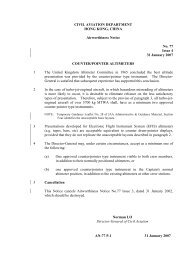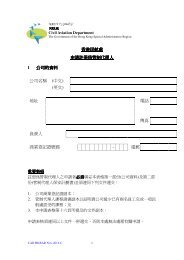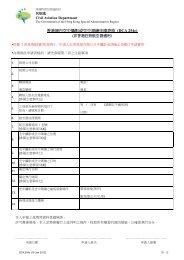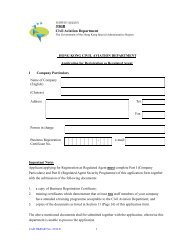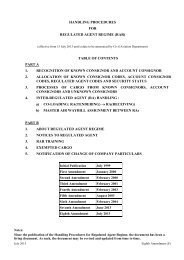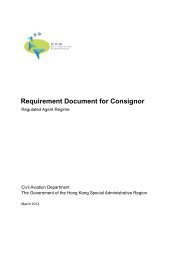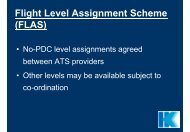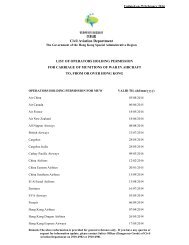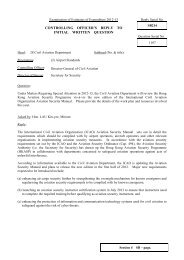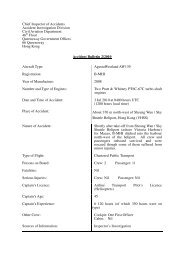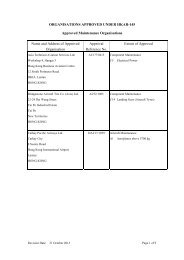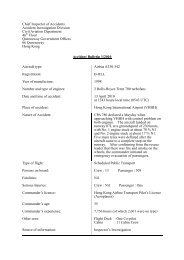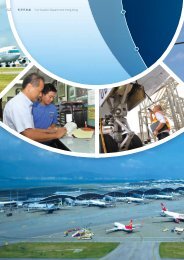HKAR-147 Approved Maintenance Training/Examinations, Issue 2 ...
HKAR-147 Approved Maintenance Training/Examinations, Issue 2 ...
HKAR-147 Approved Maintenance Training/Examinations, Issue 2 ...
- No tags were found...
Create successful ePaper yourself
Turn your PDF publications into a flip-book with our unique Google optimized e-Paper software.
Hong KongAviationRequirements<strong>HKAR</strong>-<strong>147</strong><strong>Approved</strong> <strong>Maintenance</strong><strong>Training</strong>/<strong>Examinations</strong>10 December 2012<strong>Issue</strong> 2 Revision 2CAD <strong>147</strong>Civil Aviation DepartmentHONG KONG, CHINA
<strong>HKAR</strong>-<strong>147</strong>Applications for further copies of the Hong Kong Aviation Requirements should beaddressed to:Civil Aviation Department HeadquartersFlight Standards and Airworthiness Division1 Tung Fai RoadHong Kong International AirportLantauHong Kong.Fax : (852) 2362 4250Tel : (852) 2910 6179E-mail : awo@cad.gov.hk10 December 2012 ii ISSUE 2 Revision 2
<strong>HKAR</strong>-<strong>147</strong>CONTENTS (Layout)<strong>HKAR</strong>-<strong>147</strong>APPROVED MAINTENANCE TRAINING/EXAMINATIONSFOREWORDCHECKLIST OF PAGESPREAMBLESSECTION 1 - REQUIREMENTSSECTION 2 - ACCEPTABLE MEANS OF COMPLIANCE (AMC)SECTION 3 - GUIDANCE MATERIAL (GM)SECTION 4 - APPENDICESISSUE 2 Revision 2 C-110 December 2012
<strong>HKAR</strong>-<strong>147</strong>ParagraphPageGM <strong>147</strong>.405APPENDICESRevocation, suspension, limitation or refusal to renewthe approval or acceptanceAPPENDIX 1 Basic <strong>Training</strong> Course Duration 4-APP 1-1APPENDIX 2<strong>Maintenance</strong> <strong>Training</strong> Organisation Exposition 4-APP 2-1(MTOE)APPENDIX 3 Example of <strong>Training</strong> Certificate 4-APP 3-13-610 December 2012 C-4ISSUE 2 Revision 2
<strong>HKAR</strong>-<strong>147</strong>FOREWORD1 The Civil Aviation Department of the Hong Kong Special AdministrativeRegion (HKSAR) of the People's Republic of China has publishedcomprehensive and detailed aviation requirements, referred to as the HongKong Aviation Requirements (<strong>HKAR</strong>) with a view to setting up standardsand minimising type certification problems, to facilitate the export andimport of aviation products, to make it easier for maintenance carried out inHong Kong. In addition, maintenance personnel should be trained andqualified to an international standard to assist the aviation industry inobtaining suitable staff.2 Article 12 of the Air Navigation (Hong Kong) Order 1995 as amended givesthe Chief Executive of the HKSAR responsibility of approving a person toprovide or conduct any course of training or instruction; and approving aperson as qualified to furnish reports to him; and authorising a person toprovide or conduct examinations or tests.Note:A "person" may include a body corporate.3 EASA Part <strong>147</strong> has been selected to provide where appropriate the content of<strong>HKAR</strong>-<strong>147</strong>, the maintenance training standard for maintenance certifyingstaff.4 Amendments are incorporated into the text by means of a 'Revision' or acomplete 'Re-issue'.5 New, amended and corrected text is indicated by a marginal line.ISSUE 2 F-131 August 2008
<strong>HKAR</strong>-<strong>147</strong>HONG KONG AVIATION REQUIREMENTSCHECKLIST OF PAGESAPPROVED MAINTENANCE TRAINING/EXAMINATIONSFIRST ISSUE, DATED 1 January 2000ISSUE1 REVISION 1, DATED 30 June 2003ISSUE 2, DATED 31 August 2010ISSUE 2 REVISION 1, DATED 30 November 2010ISSUE 2 REVISION 2, DATED 10 December 2012The following pages of <strong>HKAR</strong>-<strong>147</strong> are now current:Page NoLegendTitle Page 10 December 2012ii 10 December 2012C-1 to C-4 10 December 2012F-1 31 August 2008CL-1 10 December 2012P-1 to P-3 10 December 20121-0-1 31 August 20081-1 to 1-18 30 November 20102-0-1 31 August 20082-1 to 2-11 30 November 20103-0-1 31 August 20083-1 to 3-6 30 November 20104-APP 1-1 31 August 20084-APP 2-1 to 4-APP 2-2 31 August 20084-APP 3-1 to 4-APP 3-4 31 August 2008ISSUE 2 Revision 2 CL-110 December 2012
<strong>HKAR</strong>-<strong>147</strong>PREAMBLESThe preambles are intended to be a summarised record of the main changes introducedby each amendment of <strong>HKAR</strong>-<strong>147</strong>.<strong>Issue</strong> 1 1 January 2000New requirement for the training / examination of maintenance certifying staff to thestandard of <strong>HKAR</strong>-66 to qualify under the authority of a <strong>HKAR</strong>-145 organisation toissue <strong>HKAR</strong> 145.50 certificates of release to service.<strong>Issue</strong> 1 Revision 1 30 June 2003 Amended IEM <strong>147</strong>.1 for listing of <strong>HKAR</strong>-<strong>147</strong> approved maintenance trainingorganisations. Amended <strong>HKAR</strong> <strong>147</strong>.35(d) to include an alternative arrangement for the acceptanceof knowledge examiners and practical assessors. Inclusion of <strong>HKAR</strong> <strong>147</strong>.65(a)(12), <strong>HKAR</strong> <strong>147</strong>.70(d) and AMC/IEM <strong>147</strong>.70(d) forsub-contracting of trainings and examinations. Amended <strong>HKAR</strong> <strong>147</strong>.85(b) to include the sub-category B3. Inclusion of IEM <strong>147</strong>.85(f), (g), (h), (i), (j), (k) the interpretation on "training hour"referred to. Inclusion of <strong>HKAR</strong> <strong>147</strong>.105(b) and AMC/IEM <strong>147</strong>.105(b) for the sub-division ofaircraft type training into airframe type training, powerplant type training or avionictype training. The term "Director" appeared throughout the requirements have been amended toread "Director-General". Appendix 1 deleted. Subject topics in Appendix 2 amended to align with the changes in <strong>HKAR</strong>-<strong>147</strong>requirements. Other minor changes are incorporated.ISSUE 2 Revision 2 P-110 December 2012
<strong>HKAR</strong>-<strong>147</strong><strong>Issue</strong> 2 31 August 2008 Changed the infrastructure of the <strong>HKAR</strong>-<strong>147</strong> publication. There are four sectionswhere Section 1 contains the requirements and Sections 2, 3 and 4 contain theAcceptable Means of Compliance (AMC), the Guidance Material (GM) and theAppendices respectively. Changed the paragraph numbering of the <strong>HKAR</strong>-<strong>147</strong> to those of EASA Part <strong>147</strong>. Deleted the definition of “Accountable Manager” and with the provisionsincorporated in <strong>HKAR</strong> <strong>147</strong>.105 and AMC <strong>147</strong>.105. Extended the privilege of a <strong>HKAR</strong>-<strong>147</strong> approved maintenance training organisationregarding conduct examination on behalf of the Director-General to cover practicalassessment. Adjusted the approved basic training hours and conversion training hours to EASAstandards. Added a Note in <strong>HKAR</strong> <strong>147</strong>.105 advising that the Guidance for <strong>HKAR</strong>-<strong>147</strong>Authorised Examiner is contained in <strong>HKAR</strong>-2. Added a new provision in <strong>HKAR</strong> <strong>147</strong>.140 for approving minor amendments to themaintenance training organisation exposition through an exposition procedure. Added the provisions for handling audit findings in <strong>HKAR</strong> <strong>147</strong>.160. Upgraded the AMC <strong>147</strong>.30(b) on maximum number of students undergoingknowledge training to <strong>HKAR</strong> <strong>147</strong>.100(b), Upgraded the AMC <strong>147</strong>.30(d) and (e) on maximum number of students undergoingpractical training to <strong>HKAR</strong> <strong>147</strong>.100(f). Upgraded the AMC <strong>147</strong>.35(e) on frequency of instructor/examiner updating trainingto <strong>HKAR</strong> <strong>147</strong>.105. Relocated the provisions on percentage of knowledge training required in AMC<strong>147</strong>.85(f) and (g) to Section 4 Appendix 1. Added a new provision on records in respect of instructors, knowledge examiners andpractical assessors in AMC <strong>147</strong>.110. Added a new provision regarding when can a disqualified examiner be reinstated inGM <strong>147</strong>.135.10 December 2012 P-2ISSUE 2 Revision 2
<strong>HKAR</strong>-<strong>147</strong><strong>Issue</strong> 2 Revision 1 30 November 2010 Added new provisions in <strong>HKAR</strong> <strong>147</strong>.5 and <strong>HKAR</strong> <strong>147</strong>.105 (a) for theimplementation a Safety Management System. Amended the paragraph title of <strong>HKAR</strong> <strong>147</strong>.130 and added a new provision in <strong>HKAR</strong><strong>147</strong>.130 (c) to include safety management system. Amended the AMC <strong>147</strong>.105 to add a personnel requirement of a safety manager forthe management of the safety management system. Amended the paragraph title of AMC and GM <strong>147</strong>.130 (b) to include safetymanagement system.<strong>Issue</strong> 2 Revision 2 10 December 2012 Amended address and telephone number of CAD on page ii.ISSUE 2 Revision 2 P-310 December 2012
SECTION 1<strong>HKAR</strong>-<strong>147</strong>SECTION 1 – REQUIREMENTS1 GENERAL1.1 This Section 1 contains the Requirements for <strong>Maintenance</strong> <strong>Training</strong>.2 PRESENTATION2.1 The requirements of <strong>HKAR</strong>-<strong>147</strong> are presented in full page width on loosepages, each page being identified by the date of issue or issue/revisionnumber under which it is reissued or amended.2.2 Sub-headings are in bold typeface.2.3 Explanatory Notes not forming part of the requirements appear in smallertypeface.2.4 New, amended and corrected text is indicated by a marginal line.ISSUE 2 1-0-131 August 2008
SECTION 1<strong>HKAR</strong>-<strong>147</strong>SUBPART AGENERAL<strong>HKAR</strong> <strong>147</strong>.1General(a)(b)(c)(d)<strong>HKAR</strong>-<strong>147</strong> prescribes the requirements to be met by organisations seekingapproval to conduct approved training/examination of certifying staff asspecified in <strong>HKAR</strong>-66.<strong>Approved</strong> basic training is required by <strong>HKAR</strong>-66 to qualify for themaximum reduction in total maintenance experience specified in <strong>HKAR</strong>-66.To qualify for the paragraph (b) approved basic training the organisationshall be approved by the Director-General in accordance with <strong>HKAR</strong>-<strong>147</strong>Subparts B and C.An organisation may be approved by the Director-General in accordancewith <strong>HKAR</strong>-<strong>147</strong> Subparts B and D to carry out the aircraft type trainingspecified in <strong>HKAR</strong>-66.<strong>HKAR</strong> <strong>147</strong>.5Effectivity(a) <strong>HKAR</strong>-<strong>147</strong> was first issued on 1 January 2000 and became effective on 1January 2001.(b)(c)(d)(e)After 1 January 2001, any new applicant required to be approved shall be inaccordance with <strong>HKAR</strong> <strong>147</strong>.1(c) and (d).After 1 January 2003 any organisation required to be approved in accordancewith <strong>HKAR</strong> <strong>147</strong>.1(c) and (d) shall be in compliance with <strong>HKAR</strong>-<strong>147</strong>.A <strong>HKAR</strong>-<strong>147</strong> approval may be issued by the Director-General at any timeafter the paragraph (a) effective date.Notwithstanding paragraph (d), training organisations may continue to bequalified in accordance with Hong Kong Aviation Requirements in forceprior to the paragraph (a) effective date until 1 January 2003.ISSUE 2 Revision 1 1-130 November 2010
<strong>HKAR</strong>-<strong>147</strong> SECTION 1(f) Organisations shall implement a Safety Management System on 17November 2011.<strong>HKAR</strong> <strong>147</strong>.10Definitions(See GM <strong>147</strong>.10)For the purpose of <strong>HKAR</strong>-<strong>147</strong> the following definitions shall apply:'<strong>Approved</strong> basic training course' means a defined course of maintenance trainingdesigned to give a level of knowledge and some experience to a student such that itjustifies the reduction in maintenance experience permitted by <strong>HKAR</strong>-66.'CAD' means Civil Aviation Department of the Hong Kong Special AdministrativeRegion of the People's Republic of China.'Director-General' means the Director-General of Civil Aviation who is authorisedfor the purpose under the Air Navigation (Hong Kong) Order 1995, as amended bythe Chief Executive of the Hong Kong Special Administrative Region of thePeople's Republic of China and includes any person who is delegated for thatpurpose.'Terms of Reference' means the scope of work that a person is responsible for andauthorised to carry out on behalf of the <strong>HKAR</strong>-<strong>147</strong> approved maintenance trainingorganisation.'Organisation' means an organisation registered as a legal entity. Such anorganisation may conduct business from more than one address and may hold morethan one Hong Kong Aviation Requirements (<strong>HKAR</strong>) approval.<strong>HKAR</strong> <strong>147</strong>.15Applicability(See AMC <strong>147</strong>.15 and GM <strong>147</strong>.15)(a)<strong>HKAR</strong>-<strong>147</strong> Subpart B prescribes the requirements for issuing approvals tomaintenance training organisations to conduct the approved training courses30 November 2010 1-2ISSUE 2 Revision 1
SECTION 1<strong>HKAR</strong>-<strong>147</strong>and/or examinations required by <strong>HKAR</strong>-66 and for such organisations toissue certificates to students upon successful completion of such courses.(b)(c)<strong>Maintenance</strong> training organisations located in Hong Kong may be grantedapproval when in compliance with <strong>HKAR</strong>-<strong>147</strong> Subparts B and C or SubpartsB and D or a combination of both.<strong>Maintenance</strong> training organisations located outside Hong Kong may begranted approval if the Director-General is satisfied that there is a need forsuch approval. Alternatively, the Director-General may accept anorganisation located outside Hong Kong on the basis of an approval issuedby the National Authority subject to the organisation being in compliancewith any additional conditions that ensure equivalence to <strong>HKAR</strong>-<strong>147</strong>.<strong>HKAR</strong> <strong>147</strong>.20Application and issue(a)(b)(c)An application for the issue, variation or renewal of a <strong>HKAR</strong>-<strong>147</strong>maintenance training organisation approval shall be made on a CAD FormTwelve and submitted with a copy of the maintenance training organisationexposition prescribed by the Director-General or amendment thereto.An applicant that has demonstrated to the Director-General that theorganisation meets the relevant <strong>HKAR</strong>-<strong>147</strong> requirements and has paid thefees prescribed by the Director-General is entitled to a <strong>HKAR</strong>-<strong>147</strong>maintenance training organisation approval.The approval when granted will apply to the whole maintenance trainingorganisation headed by the accountable manager.<strong>HKAR</strong> <strong>147</strong>.25Extent of approvalThe grant of approval is indicated by the issue of a <strong>HKAR</strong>-<strong>147</strong> approval certificateto the maintenance training organisation. The <strong>HKAR</strong>-<strong>147</strong> approval certificate willspecify the extent of approval. The classes and ratings possible under <strong>HKAR</strong>-<strong>147</strong>are contained in Chapter 27 of <strong>HKAR</strong>-2 Administrative and Guidance Material.ISSUE 2 Revision 1 1-330 November 2010
<strong>HKAR</strong>-<strong>147</strong> SECTION 1SUBPART BORGANISATIONAL REQUIREMENTS<strong>HKAR</strong> <strong>147</strong>.100Facility requirements(See AMC <strong>147</strong>.100 and GM <strong>147</strong>.100)(a)(b)The size and structure of facilities shall ensure protection from the prevailingweather elements and proper operation of all planned training andexamination on any particular day.Fully enclosed appropriate accommodation separate from other facilitiesshall be provided for the instruction of theory and the conduct of knowledgeexaminations.(1) The maximum number of students undergoing knowledge trainingduring any training course shall not exceed 28.(2) The size of accommodation for examination purposes shall be suchthat no student can read the paperwork or computer screen of anyother student from his or her position during examinations.(c)(d)(e)The paragraph (b) accommodation environment shall be maintained suchthat students are able to concentrate on their studies or examination asappropriate, without undue distraction or discomfort.In the case of a basic training course, basic training workshops and/ormaintenance facilities separate from training classrooms shall be providedfor practical instruction appropriate to the planned training course. Ifhowever, the <strong>HKAR</strong>-<strong>147</strong> approved maintenance training organisation isunable to provide such facilities, arrangements may be made with anotherorganisation to provide such workshops and/or maintenance facilities, inwhich case, a written agreement shall be made with such organisationspecifying the conditions of access and use thereof. The Director-Generalshall require access to any such contracted organisation and the writtenagreement shall specify this access.In the case of an aircraft type/task training course access shall be provided toappropriate facilities containing examples of the aircraft type as specified in<strong>HKAR</strong> <strong>147</strong>.115(d).30 November 2010 1-4ISSUE 2 Revision 1
SECTION 1<strong>HKAR</strong>-<strong>147</strong>(f)(g)(h)(i)The maximum number of students undergoing practical training during anytraining course shall not exceed 15 per supervisor or assessor.Office accommodation shall be provided for instructors, knowledgeexaminers and practical assessors of a standard to ensure that they canprepare for their duties without undue distraction or discomfort.Secure storage facilities shall be provided for examination papers andtraining records. The storage environment shall be such that documentsremain in good condition for the retention period as specified in <strong>HKAR</strong><strong>147</strong>.125. The storage facilities and office accommodation may be combined,subject to adequate security.A library shall be provided containing all technical material appropriate tothe scope and level of training undertaken.<strong>HKAR</strong> <strong>147</strong>.105Personnel requirements(See AMC <strong>147</strong>.105 and GM <strong>147</strong>.105)(a)The <strong>HKAR</strong>-<strong>147</strong> approved maintenance training organisation shall appoint anaccountable manager who has corporate authority for ensuring that alltraining commitments can be financed and carried out to the standardrequired by <strong>HKAR</strong>-<strong>147</strong>. The accountable manager shall also ensure animplementation of a Safety Management System.(b)(c)A person or group of persons, whose responsibilities include ensuring thatthe maintenance training organisation is in compliance with <strong>HKAR</strong>-<strong>147</strong>,shall be nominated. Such person(s) shall be responsible to the accountablemanager. The senior person or one person from the group of persons mayalso be the accountable manager subject to meeting the requirements for theaccountable manager as defined in paragraph (a).The <strong>HKAR</strong>-<strong>147</strong> approved maintenance training organisation shall contractsufficient staff to plan/perform knowledge and practical training, conductknowledge examinations and practical assessments in accordance with theapproval.ISSUE 2 Revision 1 1-530 November 2010
<strong>HKAR</strong>-<strong>147</strong> SECTION 1(d)(e)(f)By derogation to paragraph (c), when another organisation is used to providepractical training and assessments, such other organisation's staff may benominated to carry out practical training and assessments.Any person may carry out any combination of the roles of instructor,examiner and assessor, subject to compliance with paragraph (f).The experience and qualifications of instructors, knowledge examiners andpractical assessors shall be established as an officially recognised standard.Note:Guidance for <strong>HKAR</strong>-<strong>147</strong> Authorised Examiner is contained in Chapter 30 of<strong>HKAR</strong>-2 Administrative and Guidance Material.(g)(h)The knowledge examiners and practical assessors shall be specified in themaintenance training organisation exposition for the acceptance of such staff.Instructors and knowledge examiners shall undergo updating training at leastevery 24 months relevant to current technology, practical skills, humanfactors and the latest training techniques appropriate to the knowledge beingtrained or examined.<strong>HKAR</strong> <strong>147</strong>.110Records of instructors, examiners and assessors(See AMC <strong>147</strong>.110 and GM <strong>147</strong>.110)(a)(b)The <strong>HKAR</strong>-<strong>147</strong> approved maintenance training organisation shall maintain arecord of all instructors, knowledge examiners and practical assessors.These records shall reflect the experience and qualification, training historyand any subsequent training undertaken.Terms of Reference shall be drawn up for all instructors, knowledgeexaminers and practical assessors. Any limitation of the scope of authorityof the individual, particularly those staff designated in <strong>HKAR</strong> <strong>147</strong>.105(g),must be clearly indicated.30 November 2010 1-6ISSUE 2 Revision 1
SECTION 1<strong>HKAR</strong>-<strong>147</strong><strong>HKAR</strong> <strong>147</strong>.115Instructional equipment(See AMC <strong>147</strong>.115 and GM <strong>147</strong>.115)(a)Each classroom shall have appropriate presentation equipment of a standardthat ensures students can easily read presentation text/drawings/diagrams andfigures from any position in the classroom.Presentation equipment shall include representative synthetic trainingdevices to assist students in their understanding of the particular subjectmatter where such devices are considered beneficial for such purposes.(b)(c)(d)The basic training workshops and/or maintenance facilities as specified in<strong>HKAR</strong> <strong>147</strong>.100(d) must have all tools and equipment necessary to performthe approved scope of training.The basic training workshops and/or maintenance facilities as specified in<strong>HKAR</strong> <strong>147</strong>.100(d) must have an appropriate selection of aircraft, engines,aircraft parts and avionic equipment.The aircraft type training organisation as specified in <strong>HKAR</strong> <strong>147</strong>.100(e)must have access to the appropriate aircraft type. Synthetic training devicesmay be used when such synthetic training devices ensure adequate trainingstandards.<strong>HKAR</strong> <strong>147</strong>.120<strong>Maintenance</strong> training material(See AMC <strong>147</strong>.120)(a)<strong>Maintenance</strong> training course material shall be provided to the student andcover as applicable:(1) the basic knowledge syllabus specified in <strong>HKAR</strong>-66 for the relevantaircraft maintenance licence category or sub-category and,(2) the type course content required by <strong>HKAR</strong>-66 for the relevant aircrafttype and aircraft maintenance licence category or sub-category.ISSUE 2 Revision 1 1-730 November 2010
<strong>HKAR</strong>-<strong>147</strong> SECTION 1(b)Students shall have access to examples of maintenance documentation andtechnical information of the library as specified in <strong>HKAR</strong> <strong>147</strong>.100(i).<strong>HKAR</strong> <strong>147</strong>.125RecordsThe <strong>HKAR</strong>-<strong>147</strong> approved maintenance training organisation shall keep all studenttraining, examination and assessment records for at least five years followingcompletion of the particular student's course.<strong>HKAR</strong> <strong>147</strong>.130<strong>Training</strong> procedures, safety management and quality systems(See AMC <strong>147</strong>.130 and GM <strong>147</strong>.130)(a)(b)The <strong>HKAR</strong>-<strong>147</strong> approved maintenance training organisation shall establishprocedures acceptable to the Director-General to ensure proper trainingstandards and compliance with all relevant requirements in <strong>HKAR</strong>-<strong>147</strong>.The <strong>HKAR</strong>-<strong>147</strong> approved maintenance training organisation shall establish aquality system including:(1) an independent audit function to monitor training standards, theintegrity of knowledge examinations and practical assessments,compliance with and adequacy of the procedures, and(2) a feedback system of the audit findings to the person(s) andultimately to the accountable manager referred to in <strong>HKAR</strong><strong>147</strong>.105(a) to ensure, as necessary, corrective action.(c)The <strong>HKAR</strong>-<strong>147</strong> approved maintenance training organisation shall establish asafety management system meeting the relevant CAD 712 requirements.<strong>HKAR</strong> <strong>147</strong>.135<strong>Examinations</strong>(See AMC <strong>147</strong>.135 and GM <strong>147</strong>.135)(a)(b)The examination staff shall ensure the security of all questions.Any student found during a knowledge examination to be cheating or in30 November 2010 1-8ISSUE 2 Revision 1
SECTION 1<strong>HKAR</strong>-<strong>147</strong>possession of material pertaining to the examination subject other than theexamination papers and associated authorised documentation shall bedisqualified from taking the examination and may not take any examinationfor at least 12 months after the date of the incident. The Director-Generalshall be informed of any such incident together with the details of anyenquiry within one calendar month.(c)Any examiner found during a knowledge examination to be providingquestion answers to any student being examined shall be disqualified fromacting as an examiner and the examination declared void. The Director-General shall be informed of any such occurrence within one calendarmonth.<strong>HKAR</strong> <strong>147</strong>.140<strong>Maintenance</strong> training organisation exposition(See AMC <strong>147</strong>.140)(a)The <strong>HKAR</strong>-<strong>147</strong> approved maintenance training organisation shall provide anexposition for use by the organisation describing the organisation and itsprocedures and containing the following information:(1) a statement signed by the accountable manager confirming that themaintenance training organisation exposition and any associatedmanuals defines the maintenance training organisation's compliancewith <strong>HKAR</strong>-<strong>147</strong> and shall be complied with at all times.(2) the title(s) and name(s) of the person(s) nominated in accordancewith <strong>HKAR</strong> <strong>147</strong>.105(b).(3) the duties and responsibilities of the person(s) specified in subparagraph(a)(2), including matters on which they may deal directlywith the Director-General on behalf of the maintenance trainingorganisation.(4) a maintenance training organisation chart showing associated chainsof responsibility of the person(s) specified in sub-paragraph (a)(2).(5) a list of the training instructors, knowledge examiners and practicalassessors.ISSUE 2 Revision 1 1-930 November 2010
<strong>HKAR</strong>-<strong>147</strong> SECTION 1(6) a general description of the training and examination facilities locatedat each address specified in the <strong>HKAR</strong>-<strong>147</strong> approval certificate, andif appropriate any other location, as required by <strong>HKAR</strong> <strong>147</strong>.145(b).(7) a list of the maintenance training courses which form the extent of theapproval.(8) the maintenance training organisation exposition amendmentprocedure.(9) the maintenance training organisation procedures, as required by<strong>HKAR</strong> <strong>147</strong>.130(a).(10) the maintenance training organisation control procedure, as requiredby <strong>HKAR</strong> <strong>147</strong>.145(c), when authorised to conduct training,examination and assessments in locations different from thosespecified in <strong>HKAR</strong> <strong>147</strong>.145(b).(11) a list of the locations pursuant to <strong>HKAR</strong> <strong>147</strong>.145(b).(12) a list of organisations, if appropriate, as specified in <strong>HKAR</strong><strong>147</strong>.145(d).(b)(c)The maintenance training organisation exposition and any subsequentamendments shall be approved by the Director-General.Notwithstanding paragraph (b) minor amendments to the maintenancetraining organisation exposition may be approved through an expositionprocedure (hereinafter called indirect approval).<strong>HKAR</strong> <strong>147</strong>.145Privileges of the <strong>HKAR</strong>-<strong>147</strong> approved maintenance training organisation(See AMC <strong>147</strong>.145 and GM <strong>147</strong>.145)(a)The <strong>HKAR</strong>-<strong>147</strong> approved maintenance training organisation may carry outthe following as permitted by and in accordance with the maintenancetraining organisation exposition:30 November 2010 1-10ISSUE 2 Revision 1
SECTION 1<strong>HKAR</strong>-<strong>147</strong>(1) basic training courses to the <strong>HKAR</strong>-66 syllabus, or part thereof.(2) aircraft type/task training courses in accordance with <strong>HKAR</strong>-66.(3) the examinations and practical assessments on behalf of the Director-General including, when requested by the Director-General, theexamination and practical assessment of students who did not attendthe basic or aircraft type training course at the <strong>HKAR</strong>-<strong>147</strong> approvedmaintenance training organisation.(4) the issue of certificates in accordance with Section 4 Appendix 3following successful completion of the approved basic or aircrafttype training courses and examinations specified in subparagraph(a)(1), (a)(2) and (a)(3), as applicable.(b)(c)<strong>Training</strong>, knowledge examinations and practical assessments may only becarried out at the locations identified in the <strong>HKAR</strong>-<strong>147</strong> approval certificateand/or at any location specified in the maintenance training organisationexposition.By derogation to paragraph (b), the <strong>HKAR</strong>-<strong>147</strong> approved maintenancetraining organisation may only conduct training, knowledge examinationsand practical assessments in locations different from the paragraph (b)locations in accordance with a control procedure specified in themaintenance training organisation exposition. Such locations need not belisted in the maintenance training organisation exposition.(d) (1) The <strong>HKAR</strong>-<strong>147</strong> approved maintenance training organisation maysubcontract the conduct of basic theoretical training, type training andrelated examinations to a non maintenance training organisation onlywhen under the control of the <strong>HKAR</strong>-<strong>147</strong> approved maintenancetraining organisation quality system.(2) The subcontracting of basic theoretical training and examination islimited to <strong>HKAR</strong>-66 Appendix 1 Modules 1, 2, 3, 4, 5, 6, 8, 9 and 10.(3) The subcontracting of type training and examination is limited topowerplant and avionic systems.ISSUE 2 Revision 1 1-1130 November 2010
<strong>HKAR</strong>-<strong>147</strong> SECTION 1(e)An organisation may not be approved to conduct only examinations unlessapproved to conduct training.<strong>HKAR</strong> <strong>147</strong>.150Changes to the <strong>HKAR</strong>-<strong>147</strong> approved maintenance training organisation(a)(b)(c)The <strong>HKAR</strong>-<strong>147</strong> approved maintenance training organisation shall notify theDirector-General of any proposed changes to the organisation that affect theapproval before any such change takes place, in order to enable the Director-General to determine continued compliance with <strong>HKAR</strong>-<strong>147</strong> and to amend ifnecessary the <strong>HKAR</strong>-<strong>147</strong> approval certificate.The Director-General may prescribe the conditions under which the <strong>HKAR</strong>-<strong>147</strong> approved maintenance training organisation may operate during suchchanges unless the Director-General determines that the <strong>HKAR</strong>-<strong>147</strong>approval must be suspended.Failure to inform the Director-General of such changes may result insuspension or revocation of the <strong>HKAR</strong>-<strong>147</strong> approval certificate backdated tothe actual date of the changes.<strong>HKAR</strong> <strong>147</strong>.155Continued validityUnless the <strong>HKAR</strong>-<strong>147</strong> approval has previously been surrendered, superseded,suspended, revoked or expired by virtue of exceeding any expiry date that may bespecified in the approval certificate, the continued validity of the approval isdependent upon:(1) the <strong>HKAR</strong>-<strong>147</strong> approved maintenance training organisation remaining incompliance with <strong>HKAR</strong>-<strong>147</strong>, in accordance with the provisions related to thehandling of findings as specified in <strong>HKAR</strong>-2 Chapter 27; and(2) the Director-General being granted access to the <strong>HKAR</strong>-<strong>147</strong> approvedmaintenance training organisation to determine continued compliance with<strong>HKAR</strong>-<strong>147</strong>; and(3) the payment of any charges prescribed by the Director-General.30 November 2010 1-12ISSUE 2 Revision 1
SECTION 1<strong>HKAR</strong>-<strong>147</strong><strong>HKAR</strong> <strong>147</strong>.160Findings(a)A level 1 finding is one or more of the following:(1) any significant non-compliance with the examination process whichwould invalidate the examination(s),(2) failure to give the Director-General access to the organisationfacilities during normal operating hours after two written requests,(3) the lack of an accountable manager,(4) a significant non-compliance with the training process.(b)(c)A level 2 finding is any non-compliance with the training process other thanlevel 1 findings.After receipt of notification of findings, the holder of the <strong>HKAR</strong>-<strong>147</strong>approval shall define a corrective action plan and demonstrate correctiveaction to the satisfaction of the Director-General within a period agreed bythe Director-General.ISSUE 2 Revision 1 1-1330 November 2010
<strong>HKAR</strong>-<strong>147</strong> SECTION 1SUBPART CTHE APPROVED BASIC TRAINING COURSE<strong>HKAR</strong> <strong>147</strong>.200The approved basic training course(See AMC <strong>147</strong>.200)(a)(b)(c)(d)(e)The approved basic training course shall consist of knowledge training,knowledge examination, practical training and a practical assessment.The knowledge training element shall cover the subject matter for a <strong>HKAR</strong>-66 category or sub-category A, B1, B2 or B3 aircraft maintenance licence asspecified in <strong>HKAR</strong>-66.The knowledge examination element shall cover a representative crosssection of subject matter from the paragraph (b) training element.The practical training element shall cover the practical use of commontooling/equipment, the disassembly/assembly of a representative selection ofaircraft parts and the participation in representative maintenance activitiesbeing carried out relevant to the particular <strong>HKAR</strong>-66 complete module.The practical assessment element shall cover the practical training anddetermine whether the student is competent at using tools and equipment andworking in accordance with maintenance manuals.(f) The duration of basic training courses shall be in accordance with Section 4Appendix 1.(g)The duration of conversion courses between (sub)categories shall bedetermined through an assessment of the basic training syllabus and therelated practical training needs.<strong>HKAR</strong> <strong>147</strong>.205Basic knowledge examinations(See AMC <strong>147</strong>.205 and AMC <strong>147</strong>.205(a)(1))(a)Basic knowledge examinations shall:(1) be in accordance with the standard defined in <strong>HKAR</strong>-66.30 November 2010 1-14ISSUE 2 Revision 1
SECTION 1<strong>HKAR</strong>-<strong>147</strong>(2) be conducted without the use of training notes.(3) cover a representative cross section of subjects from the particularmodule of training completed in accordance with <strong>HKAR</strong>-66.(b)All training subject module or sub-module basic knowledge examinations tocomplete a <strong>HKAR</strong>-66 category or sub-category must be passed within fiveyears of passing the first training subject module or sub-module basicexamination for the particular <strong>HKAR</strong>-66 category or sub-category. Anyfailed training module basic knowledge examination may not be retaken forat least one month after the date such examination was failed.<strong>HKAR</strong> <strong>147</strong>.210Basic practical assessment(See AMC <strong>147</strong>.210)(a)(b)Basic practical assessments shall be carried out during the basic maintenancetraining course by the nominated practical assessors at the completion ofeach visit period to the practical workshops/maintenance facility.The student shall achieve an assessed pass with respect to <strong>HKAR</strong><strong>147</strong>.200(e).ISSUE 2 Revision 1 1-1530 November 2010
<strong>HKAR</strong>-<strong>147</strong> SECTION 1SUBPART DAIRCRAFT TYPE / TASK TRAINING<strong>HKAR</strong> <strong>147</strong>.300Aircraft type / task training(See AMC <strong>147</strong>.300)A <strong>HKAR</strong>-<strong>147</strong> approved maintenance training organisation shall be approved tocarry out <strong>HKAR</strong>-66 aircraft type and/or task training subject to compliance with thestandard specified in <strong>HKAR</strong>-66.<strong>HKAR</strong> <strong>147</strong>.305Aircraft type examinations and task assessments(See AMC <strong>147</strong>.305)A <strong>HKAR</strong>-<strong>147</strong> approved maintenance training organisation approved in accordancewith <strong>HKAR</strong> <strong>147</strong>.300 to conduct aircraft type training shall conduct the aircraft typeexaminations or aircraft task assessments specified in <strong>HKAR</strong>-66 subject tocompliance with the aircraft type and/or task standard specified in <strong>HKAR</strong>-66.30 November 2010 1-16ISSUE 2 Revision 1
SECTION 1<strong>HKAR</strong>-<strong>147</strong>SUBPART EEQUIVALENT SAFETY AND REVOCATION<strong>HKAR</strong> <strong>147</strong>.400Equivalent safety cases(See AMC <strong>147</strong>.400)(a)(b)The Director-General may exempt a training organisation from anyrequirement in <strong>HKAR</strong>-<strong>147</strong> when satisfied that a situation exists not coveredby <strong>HKAR</strong>-<strong>147</strong> and subject to compliance with any supplementarycondition(s) the Director-General considers necessary to ensure equivalentsafety. Such supplementary condition(s) shall be agreed by the Director-General to ensure continued recognition of the approval.The Director-General may exempt an education institution from the need tocomply with all the requirements of <strong>HKAR</strong>-<strong>147</strong> subject to the Director-General being satisfied that the training and examination standards areequivalent to <strong>HKAR</strong>-66, that the training hours are in accordance with<strong>HKAR</strong> <strong>147</strong>.200 and access is permitted in accordance with <strong>HKAR</strong> <strong>147</strong>.155.Such education institutions shall be issued a <strong>HKAR</strong>-<strong>147</strong> approval certificateon the basis of this exemption.<strong>HKAR</strong> <strong>147</strong>.405Revocation, suspension, limitation, refusal to renew the <strong>HKAR</strong>–<strong>147</strong> approvalor acceptance(See GM <strong>147</strong>.405)(a)The Director-General may, on reasonable grounds after due inquiry, revoke,suspend, limit or refuse to renew the <strong>HKAR</strong>-<strong>147</strong> approval if he is notsatisfied that the holder of the approval continues to meet the requirements of<strong>HKAR</strong>-<strong>147</strong> subject to the conditions of paragraph (a)(1).(1) Before revoking, suspending, limiting or refusing to renew a <strong>HKAR</strong>-<strong>147</strong> approval, the Director-General will first give at least 28 daysnotice to the <strong>HKAR</strong>-<strong>147</strong> approval holder in writing of his intentionso to do and of the reasons for his proposal and will offer the holderan opportunity to make representations and the Director-General willconsider those representations.ISSUE 2 Revision 1 1-1730 November 2010
<strong>HKAR</strong>-<strong>147</strong> SECTION 1(b)Except as specified otherwise in paragraph (b)(1), any <strong>HKAR</strong> <strong>147</strong>.15(c)maintenance training organisation which was accepted principally on thebasis of an approval issued by another authority, may be subjected to thelimitations and conditions of paragraph (a) and (a)(1) by the Director-General.(1) Surrender, suspension, revocation or refusal to renew the approvalissued by the authority other than the Director-General invalidates the<strong>HKAR</strong>-<strong>147</strong> acceptance from the date of such approval surrender,suspension, revocation or expiry. The Director-General will informthe <strong>HKAR</strong>-<strong>147</strong> acceptance holder of such fact but cannot offer theopportunity to make sub-paragraph (a)(1) representations in this case.30 November 2010 1-18ISSUE 2 Revision 1
SECTION 2<strong>HKAR</strong>-<strong>147</strong>AMC <strong>147</strong>.15(c)ApplicabilitySee <strong>HKAR</strong> <strong>147</strong>.15(c)For the Director-General to be satisfied that there is a need, will require the potentialapplicant to provide evidence from an approved <strong>HKAR</strong>-145 maintenanceorganisation that such organisation would like to use the potential applicant'sfacilities for maintenance training. The evidence should be in the form of a letter(s)from the Hong Kong based organisation(s) giving the reasons for the need. TheDirector-General reserves the right to be satisfied that the need is genuine beforeaccepting such application.AMC <strong>147</strong>.100(i)Facility requirementsSee <strong>HKAR</strong> <strong>147</strong>.100(i)1 For approved basic maintenance training courses this means holding andensuring reasonable access to copies of all <strong>HKAR</strong> and Hong Kong aviationlegislation, examples of typical aircraft maintenance manuals and servicebulletins, airworthiness directives, aircraft and component records, releasedocumentation, procedures manuals and aircraft maintenance programmes.2 Except for the <strong>HKAR</strong> and Hong Kong aviation regulations, the remainder ofthe documentation should represent typical examples for both large andsmall aircraft and cover both aeroplanes and helicopters as appropriate.Avionic documentation should cover a representative range of availableequipment. All documentation should be reviewed and updated on a regularbasis.AMC <strong>147</strong>.105Personnel requirementsSee <strong>HKAR</strong> <strong>147</strong>.1051 The larger <strong>HKAR</strong>-<strong>147</strong> approved maintenance training organisation (anorganisation with the capacity to provide training for 50 students or more)should appoint a training manager with the responsibility for managing thetraining organisation on a day to day basis. Such person could also be theaccountable manager. In addition, the organisation should appoint a safetymanager and a quality manager with the responsibility for managing of theISSUE 2 Revision 1 2-130 November 2010
<strong>HKAR</strong>-<strong>147</strong> SECTION 2safety management system as specified in Chapter 5 of CAD 712 and thequality system as specified in paragraph <strong>HKAR</strong> <strong>147</strong>.130(b) respectively.The organisation should also appoint an examination manager with theresponsibility for managing the relevant <strong>HKAR</strong>-<strong>147</strong> Subpart C or Subpart Dexamination system. Such person(s) may also be an instructor and/orexaminer.2 The smaller <strong>HKAR</strong>-<strong>147</strong> approved maintenance training organisation (anorganisation with the capacity to provide training for less than 50 students)may combine any or all of the paragraph 1 positions subject to the Director-General verifying and being satisfied that all functions can be properlycarried out in combination.3 When the <strong>HKAR</strong>-<strong>147</strong> approved maintenance training organisation is alsoapproved against other <strong>HKAR</strong> which contain some similar functions thensuch functions may be combined.AMC <strong>147</strong>.105(a), (b) and (g)Personnel requirementsSee <strong>HKAR</strong> <strong>147</strong>.105(a), (b) and (g)A CAD Form Four should be completed for each person nominated to hold aposition required by <strong>HKAR</strong> <strong>147</strong>.105(a), (b) and (g).AMC <strong>147</strong>.105(h)Personnel requirementsSee <strong>HKAR</strong> <strong>147</strong>.105(h)Updating training should normally be of 35 hours duration but may be adjusted tothe scope of training of the organisation and particular instructor/examiner.AMC <strong>147</strong>.110Records of instructors, examiners and assessorsSee <strong>HKAR</strong> <strong>147</strong>.1101 The following minimum information relevant to the scope of activity shouldbe kept on record in respect of each instructor, knowledge examiner andpractical assessor:30 November 2010 2-2ISSUE 2 Revision 1
SECTION 2<strong>HKAR</strong>-<strong>147</strong>a. Nameb. Date of Birthc. Personnel Numberd. Experiencee. Qualificationsf. <strong>Training</strong> history (before entry)g. Subsequent <strong>Training</strong>h. Scope of activityi. Starting date of employment/contractj. If appropriate – ending date of employment/contract.2 The record may be kept in any format but should be under the control of theorganisation's quality system.3 Persons authorised to access the system should be maintained at a minimumto ensure that records cannot be altered in an unauthorised manner or thatsuch confidential records become accessible to unauthorised persons.4 The Director-General is an authorised person when investigating the recordssystem for initial and continued approval or when the Director-General hascause to doubt the competence of a particular person.AMC <strong>147</strong>.115(c)Instructional equipmentSee <strong>HKAR</strong> <strong>147</strong>.115(c)1 An appropriate selection of aircraft, engines, aircraft parts and avionicequipment means appropriate in relation to the particular subject module orsub-module of <strong>HKAR</strong>-66 being instructed. For examples:a. The turbine engine module should require the provision of sufficientparts from different types of turbine engine to show what such partslook like, what the critical areas are from a maintenance view pointand to enable disassembly/assembly exercises to be completed.b. <strong>HKAR</strong>-66 category B2 avionic training should require amongst otherequipment, access to at least one type of installed autopilot and flightdirector system such that maintenance and system functioning can beobserved and therefore more fully understood by the student in theISSUE 2 Revision 1 2-330 November 2010
<strong>HKAR</strong>-<strong>147</strong> SECTION 2working environment.2 "Access" may be interpreted to mean, in conjunction with the facilitiesrequirement of <strong>HKAR</strong> <strong>147</strong>.100(d), that there may be an agreement with a<strong>HKAR</strong>-145 approved maintenance organisation to access such parts, etc.AMC <strong>147</strong>.120(a)<strong>Maintenance</strong> training materialSee <strong>HKAR</strong> <strong>147</strong>.120(a)<strong>Training</strong> course notes, diagrams and any other instructional material should beaccurate. Where an amendment service is not provided a written warning to thiseffect should be given.AMC <strong>147</strong>.130(b)<strong>Training</strong> procedures, safety management and quality systemsSee <strong>HKAR</strong> <strong>147</strong>.130(b)1 The independent audit procedure should ensure that all aspects of <strong>HKAR</strong>-<strong>147</strong> compliance should be checked at least once in every 12 months and maybe carried out as one complete single exercise or subdivided over a 12-monthperiod in accordance with a scheduled plan.2 In a small <strong>HKAR</strong>-<strong>147</strong> approved maintenance training organisation theindependent audit function may be contracted to another <strong>HKAR</strong>-<strong>147</strong>approved maintenance training organisation or a competent personacceptable to the Director-General. Where the small training organisationchooses to contract the audit function it is conditional on the audit beingcarried out twice in every 12-month period with one such audit beingunannounced.3 Where the <strong>HKAR</strong>-<strong>147</strong> approved maintenance training organisation is alsoapproved to another <strong>HKAR</strong> requiring a quality system, then such qualitysystem may be combined.4 When training or examination is carried out under the sub-contract controlsystem:a. a pre audit procedure should be established whereby the <strong>HKAR</strong>-<strong>147</strong>30 November 2010 2-4ISSUE 2 Revision 1
SECTION 2<strong>HKAR</strong>-<strong>147</strong>approved maintenance training organisation should audit aprospective sub-contractor to determine whether the services of thesub-contractor meet the intent of <strong>HKAR</strong>-<strong>147</strong>.b. a renewal audit of the subcontractor should be performed at leastonce every 12 months to ensure continuous compliance with the<strong>HKAR</strong>-<strong>147</strong> standard.c. the sub-contract control procedure should record audits of the subcontractorand to have a corrective action follow-up plan.5 The independence of the audit system should be established by alwaysensuring that audits are carried out by personnel not responsible for thefunction or procedure being checked.AMC <strong>147</strong>.135<strong>Examinations</strong>See <strong>HKAR</strong> <strong>147</strong>.1351 <strong>Examinations</strong> may be computer or hard copy based or a combination of both.2 The actual questions to be used in a particular examination should bedetermined by the examination staff.AMC <strong>147</strong>.140<strong>Maintenance</strong> training organisation expositionSee <strong>HKAR</strong> <strong>147</strong>.1401 A recommended format of the maintenance training organisation expositionis included in Section 4 Appendix 2.2 When the <strong>HKAR</strong>-<strong>147</strong> approved maintenance training organisation isapproved in accordance with any other <strong>HKAR</strong> which also requires anexposition, the exposition required by the other <strong>HKAR</strong> may form the basis ofthe maintenance training organisation exposition in a combined document, aslong as the other exposition contains the information required by <strong>HKAR</strong><strong>147</strong>.140 and a cross reference index is included based upon Section 4Appendix 2.ISSUE 2 Revision 1 2-530 November 2010
<strong>HKAR</strong>-<strong>147</strong> SECTION 23 When training or examination is carried out under the sub-contract controlsystem the maintenance training organisation exposition should contain aspecific procedure on the control of sub-contractors as per Section 4Appendix 2 item 2.18 plus a list of sub-contractors as required by <strong>HKAR</strong><strong>147</strong>.140(a)12 and detailed in Section 4 Appendix 2 item 1.7.4 The Director-General may approve a delegated exposition approval systemfor all changes other than those affecting the <strong>HKAR</strong>-<strong>147</strong> approval.AMC <strong>147</strong>.145(d)Privileges of the <strong>HKAR</strong>-<strong>147</strong> approved maintenance training organisationSee <strong>HKAR</strong> <strong>147</strong>. 145(d)1 When training or examination is carried out under the sub-contract controlsystem it means that for the duration of such training or examination, the<strong>HKAR</strong>-<strong>147</strong> approval has been temporarily extended to include the subcontractor.It therefore follows that those parts of the sub-contractor'sfacilities, personnel and procedures involved with the <strong>HKAR</strong>-<strong>147</strong> approvedmaintenance training organisation's students should meet <strong>HKAR</strong>-<strong>147</strong>requirements for the duration of that training or examination and it remainsthe <strong>HKAR</strong>-<strong>147</strong> organisation's responsibility to ensure such requirements aresatisfied.2 The <strong>HKAR</strong>-<strong>147</strong> approved maintenance training organisation is not requiredto have complete facilities and personnel for training that it needs to subcontractbut it should have its own expertise to determine that the subcontractormeets the <strong>HKAR</strong>-<strong>147</strong> standards. Particular attention should begiven to ensuring that the training that is delivered also meets therequirements of <strong>HKAR</strong>-66 and the aircraft technologies as appropriate.3 The contract between the <strong>HKAR</strong>-<strong>147</strong> approved maintenance trainingorganisation and the sub-contractor should contain:- a provision for the Director-General to have right of access to the subcontractor.- a provision for the sub-contractor to inform the <strong>HKAR</strong>-<strong>147</strong> approvedmaintenance training organisation of any change that may affect its<strong>HKAR</strong>-<strong>147</strong> approval, before any such change takes place.30 November 2010 2-6ISSUE 2 Revision 1
SECTION 2<strong>HKAR</strong>-<strong>147</strong>AMC <strong>147</strong>.200The approved basic training courseSee <strong>HKAR</strong> <strong>147</strong>.200For the purpose of this paragraph, a training hour means 60 minutes training,without pause.AMC <strong>147</strong>.200(b)The approved basic training courseSee <strong>HKAR</strong> <strong>147</strong>.200(b)Each <strong>HKAR</strong>-66 licence category or sub-category basic training course may besubdivided into modules or sub-modules of knowledge and may be intermixed withthe practical training elements subject to the required time elements of subparagraphs<strong>HKAR</strong> <strong>147</strong>.200 (f) and (g) being satisfied.AMC <strong>147</strong>.200(d)The approved basic training courseSee <strong>HKAR</strong> <strong>147</strong>.200(d)1 Where the <strong>HKAR</strong>-<strong>147</strong> approved maintenance training organisation contractsthe practical training element either totally or in part to another organisationin accordance with <strong>HKAR</strong> <strong>147</strong>.100(d), the organisation in question shouldensure that the practical training elements are properly carried out.2 At least 30% of the practical training element should be carried in an actualmaintenance working environment.AMC <strong>147</strong>.200(g)The approved basic training courseSee <strong>HKAR</strong> <strong>147</strong>.200(g)Typical conversion durations are given below:(a)The approved basic training course to qualify for conversion from holding a<strong>HKAR</strong>-66 aircraft maintenance licence in sub-category A1 to sub-categoryB1.1 or B2 should not be less than 1600 hours and for conversion fromholding a <strong>HKAR</strong>-66 aircraft maintenance licence in sub-category A1 to sub-ISSUE 2 Revision 1 2-730 November 2010
<strong>HKAR</strong>-<strong>147</strong> SECTION 2category B1.1 combined with B2 should not be less than 2200 hours. Thecourse should include between 60% and 70% knowledge training.(b)(c)(d)The approved basic training course to qualify for conversion from holding a<strong>HKAR</strong>-66 aircraft maintenance licence in sub-category B1.1 to B2 orcategory B2 to B1.1 should not be less than 600 hours, and should includebetween 80% and 85% knowledge training.The approved basic training course to qualify for conversion from holding a<strong>HKAR</strong>-66 aircraft maintenance licence in sub-category B1.2 to sub-categoryB1.1 should not be less than 400 hours, and should include between 50% and60% knowledge training.The approved basic training course to qualify for conversion from holding a<strong>HKAR</strong>-66 aircraft maintenance licence in one sub-category A to anothersub-category A should not be less than 70 hours, and should include between30% and 40% knowledge training.AMC <strong>147</strong>.205Basic knowledge examinationsSee <strong>HKAR</strong> <strong>147</strong>.205The Director-General may accept that the <strong>HKAR</strong>-<strong>147</strong> approved maintenancetraining organisation can conduct examination of students who did not attend anapproved basic course at the <strong>HKAR</strong>-<strong>147</strong> approved maintenance trainingorganisation.AMC <strong>147</strong>.205(a)(1)Basic knowledge examinationsSee <strong>HKAR</strong> <strong>147</strong>. 205(a)(1)1 The number of written and multi-choice questions for each <strong>HKAR</strong>-66category and sub-category and the time allowed for answering suchquestions are specified in <strong>HKAR</strong>-2 Administrative and Guidance Material.2 The pass mark for each student for any <strong>HKAR</strong>–66 category A or subcategoryB1 or B2 basic module examination should not be less than thatspecified in <strong>HKAR</strong>-2 Administrative and Guidance Material.30 November 2010 2-8ISSUE 2 Revision 1
SECTION 2<strong>HKAR</strong>-<strong>147</strong>AMC <strong>147</strong>.210(a)Basic practical assessmentsSee <strong>HKAR</strong> <strong>147</strong>.210(a)Where the <strong>HKAR</strong>-<strong>147</strong> approved maintenance training organisation contracts thepractical training element either totally or in part to another organisation inaccordance with <strong>HKAR</strong> <strong>147</strong>.100(d) and chooses to nominate practical assessorsfrom the other organisation, the <strong>HKAR</strong>-<strong>147</strong> approved maintenance trainingorganisation should ensure that the basic practical assessments are carried out.AMC <strong>147</strong>.210(b)Basic practical assessmentsSee <strong>HKAR</strong> <strong>147</strong>.210(b)An assessed pass for each student should be granted when the practical assessor issatisfied that the student meets the criteria of <strong>HKAR</strong> <strong>147</strong>.200(e). This means thatthe student has demonstrated the capability to use relevant tools/equipment/testequipment as specified by the tool/equipment/test equipment manufacturer and theuse of maintenance manuals in that the student can carry out the requiredinspection/testing without missing any defects, can readily identify the location ofcomponents and is capable of correct removal/fitment/adjustment of suchcomponents. The student is only required to carry out enough inspection/testing andcomponent removal/fitment/adjustments to prove capability. The student shouldalso show an appreciation of the need to ensure clean working conditions and theobservance of safety precautions for the student and the product. In addition, thestudent should demonstrate a responsible attitude in respect to flight safety andairworthiness of the aircraft.AMC <strong>147</strong>.300Aircraft type/task trainingSee <strong>HKAR</strong> <strong>147</strong>.3001 Aircraft type training may be sub-divided into airframe type training,powerplant type training, or avionic systems type training. A <strong>HKAR</strong>-<strong>147</strong>approved maintenance training organisation may be approved to conductairframe type training only, powerplant type training only or avionic systemstype training only.ISSUE 2 Revision 1 2-930 November 2010
<strong>HKAR</strong>-<strong>147</strong> SECTION 22 Airframe type training means type training including all relevant aircraftstructure and systems excluding the powerplant.3 Powerplant type training means type training on the bare engine, includingthe build-up to a quick engine change unit.4 The Interface of the engine/airframe systems should be addressed by eitherairframe or powerplant type training.5 Avionic systems type training means type training on avionic systemscovered by but not necessarily limited to ATA chapters 22, 23, 25, 27, 31,33, 34, 45, 46, 73 and 77 or equivalent.AMC <strong>147</strong>.305Aircraft type examinationsSee <strong>HKAR</strong> <strong>147</strong>.305The pass mark for each student for any <strong>HKAR</strong>-66 aircraft type examination shouldnot be less than that specified in <strong>HKAR</strong>-2 Administrative and Guidance Material.AMC <strong>147</strong>.400Equivalent safety casesSee <strong>HKAR</strong> <strong>147</strong>.400All proposed equivalent safety cases should be submitted to the Director-General forconsideration as an acceptable case.AMC <strong>147</strong>.400(b)Equivalent safety casesSee <strong>HKAR</strong> <strong>147</strong>.400(b)Education institutions may be exempt from:1 the need to be an organisation as specified in <strong>HKAR</strong> <strong>147</strong>.10.2 the need for an accountable manager but subject to the limitation that theinstitution appoints a senior person to manage the training organisation andsuch person has a budget sufficient to operate the organisation to thestandard of <strong>HKAR</strong>-<strong>147</strong>.30 November 2010 2-10ISSUE 2 Revision 1
SECTION 2<strong>HKAR</strong>-<strong>147</strong>3 the need for the independent audit part of a quality system subject to theinstitution operating an independent schools inspectorate to audit the <strong>HKAR</strong>-<strong>147</strong> approved maintenance training organisation at the frequency required by<strong>HKAR</strong>-<strong>147</strong>.ISSUE 2 Revision 1 2-1130 November 2010
SECTION 2<strong>HKAR</strong>-<strong>147</strong>SECTION 2 – Acceptable Means of Compliance (AMC)1 GENERAL1.1 This Section contains Acceptable Means of Compliance that has been agreedfor inclusion in <strong>HKAR</strong>-<strong>147</strong>. Acceptable Means of Compliance (AMC)illustrate a means, or several alternative means, but not necessarily the onlypossible means by which a requirement can be met.1.2 Where a particular <strong>HKAR</strong> paragraph does not have an Acceptable Means ofCompliance or any Guidance Material, it is considered that nosupplementary material is required.2 PRESENTATION2.1 The Acceptable Means of Compliance is presented in full page width onloose pages, each page being identified by the date of issue or theissue/revision number under which it is reissued or amended.2.2 A numbering system has been used in which the Acceptable Means ofCompliance uses the same number as the <strong>HKAR</strong> paragraph to which itrefers. The number is introduced by the letters AMC to distinguish thematerial from the <strong>HKAR</strong> itself.2.3 Explanatory Notes not forming part of the AMC text appear in a smallertypeface.2.4 New, amended or corrected text is indicated by a marginal line.ISSUE 2 2-0-131 August 2008
SECTION 3<strong>HKAR</strong>-<strong>147</strong>SECTION 3 – Guidance Material (GM)1 GENERAL1.1 This Section contains Guidance Material that has been agreed for inclusionin <strong>HKAR</strong>-<strong>147</strong>.1.2 Where a particular <strong>HKAR</strong> paragraph does not have an Acceptable Means ofCompliance or any Guidance Material, it is considered that nosupplementary material is required.2 PRESENTATION2.1 The Guidance Material is presented in full page width on loose pages, eachpage being identified by the date of issue or the issue/revision number underwhich it is reissued or amended.2.2 A numbering system has been used in which the Guidance Material uses thesame number as the <strong>HKAR</strong> paragraph to which it refers. The number isintroduced by the letters GM to distinguish the material from the <strong>HKAR</strong>itself.2.3 Guidance Material (GM) helps to illustrate the meaning of a requirement.2.4 Explanatory Notes not forming part of the GM text appear in a smallertypeface.2.5 New, amended or corrected text is indicated by a marginal line.ISSUE 2 3-0-131 August 2008
SECTION 3<strong>HKAR</strong>-<strong>147</strong>GM <strong>147</strong>.10DefinitionsSee <strong>HKAR</strong> <strong>147</strong>.10With regard to the 'organisation' definition, any organisation registered outside HongKong as a legal entity with training facilities inside Hong Kong may need to showthat it can legally conduct business in Hong Kong.GM <strong>147</strong>.15(b)ApplicabilitySee <strong>HKAR</strong> <strong>147</strong>.15(b)1 For an organisation to be approved in accordance with <strong>HKAR</strong> <strong>147</strong>.15(b) asan organisation located in Hong Kong means that the <strong>HKAR</strong> <strong>147</strong>.105(b)management should be located in Hong Kong. It also follows that when the<strong>HKAR</strong> <strong>147</strong>.105(b) management is located outside Hong Kong <strong>HKAR</strong><strong>147</strong>.15(c) applies. However it should be noted that such an organisation mayuse a 'nationally based' management structure to satisfy <strong>HKAR</strong> <strong>147</strong>.105(b)rather than the 'internationally based' management structure of such anorganisation in which case <strong>HKAR</strong> <strong>147</strong>.15(b) would apply.2 Where the organisation uses facilities both inside and outside Hong Kongunder the same <strong>HKAR</strong>-<strong>147</strong> approval such facilities may be included in theapproval being identified on the approval certificate subject to themaintenance training organisation exposition identifying the facilities andcontaining procedures to control such facilities and the Director-Generalbeing satisfied that they form an integral part of the <strong>HKAR</strong>-<strong>147</strong> approvedmaintenance training organisation.GM <strong>147</strong>.15(c)ApplicabilitySee <strong>HKAR</strong> <strong>147</strong>.15(c)1 The principal reason for the Director-General accepting an organisation onthe basis of an approval granted by another civil aviation authority is toensure the most cost effective use of his staff resources. It therefore followsthat the Director-General will attempt to use this method in any country orplace that contains a significant number of maintenance trainingorganisations used by the aviation industry of Hong Kong.ISSUE 2 Revision 1 3-130 November 2010
<strong>HKAR</strong>-<strong>147</strong> SECTION 32 The Director-General's policy in respect of accepting an organisation on thebasis of an approval granted by the other authority is to ensure equivalenceto <strong>HKAR</strong>-<strong>147</strong>.The Director-General establishes equivalence to <strong>HKAR</strong>-<strong>147</strong> by:a. comparing the relevant maintenance training regulations and workingprocedures of the other authority with <strong>HKAR</strong>-<strong>147</strong> and <strong>HKAR</strong>-2Administrative and Guidance Material to determine differences andestablish additional conditions relative to the differences.b. being satisfied that the other authority will cooperate with theDirector-General by carrying out and reporting on routine audits andspecific investigations of the organisations and training standards.c. being satisfied that the <strong>HKAR</strong>-<strong>147</strong> accepted maintenance trainingorganisations comply with the additional conditions established viasub-paragraph a. and that the other authority reports any noncompliancethat could result in suspension or revocation of the<strong>HKAR</strong>-<strong>147</strong> acceptance.d. publishing the additional conditions for organisations in each countryor place as AMC in the form of Appendices to <strong>HKAR</strong>-<strong>147</strong> Section 2or equivalent means.3 Notwithstanding sub-paragraphs 1 and 2 when such a training organisationhas a facility located in Hong Kong then approval in accordance with <strong>HKAR</strong><strong>147</strong>.15(b) will be required.GM <strong>147</strong>.100(i)Facility requirementsSee <strong>HKAR</strong> <strong>147</strong>.100(i)Where the <strong>HKAR</strong>-<strong>147</strong> approved maintenance training organisation has an existinglibrary of regulations, manuals and documentation required by another <strong>HKAR</strong> it isnot necessary to duplicate such a facility subject to student access being undercontrolled supervision.30 November 2010 3-2ISSUE 2 Revision 1
SECTION 3<strong>HKAR</strong>-<strong>147</strong>GM <strong>147</strong>.105(c)Personnel requirementsSee <strong>HKAR</strong> <strong>147</strong>.105(c)The <strong>HKAR</strong>-<strong>147</strong> approved maintenance training organisation should have a nucleusof permanently employed staff to undertake the minimum amount of maintenancetraining proposed but may contract, on a part time basis, instructors for subjectswhich are only taught on an occasional basis.GM <strong>147</strong>.105(f)Personnel requirementsSee <strong>HKAR</strong> <strong>147</strong>.105(f)It is recommended that potential instructors be trained in instructional techniques.GM <strong>147</strong>.105(g)Personnel requirementsSee <strong>HKAR</strong> <strong>147</strong>.105(g)Examiners should demonstrate a clear understanding of the examination standardrequired by <strong>HKAR</strong>-66 and have a responsible attitude to the conduct ofexaminations such that the highest integrity is ensured.GM <strong>147</strong>.105(h)Personnel requirementsSee <strong>HKAR</strong> <strong>147</strong>.105(h)1 Records should show for each instructor/examiner when the updatingtraining was scheduled and when it took place.2 The updating training may be subdivided during the 24 months into morethan one element and may include such activities as attendance at relevantlectures and symposiums.ISSUE 2 Revision 1 3-330 November 2010
<strong>HKAR</strong>-<strong>147</strong> SECTION 3GM <strong>147</strong>.110Records of Instructors, examiners and assessorsSee <strong>HKAR</strong> <strong>147</strong>.110Instructors, knowledge examiners and practical assessors should be provided with acopy of their Terms of Reference.GM <strong>147</strong>.115(a)Instructional equipmentSee <strong>HKAR</strong> <strong>147</strong>.115(a)1 Synthetic training devices are working models of a particular system orcomponent and include computer simulations.2 A synthetic training device is considered beneficial for complex systems andfault diagnostic purposes.GM <strong>147</strong>.130(b)<strong>Training</strong> procedures, safety management and quality systemsSee <strong>HKAR</strong> <strong>147</strong>.130(b)1 The primary objective of the quality system is to enable the <strong>HKAR</strong>-<strong>147</strong>approved maintenance training organisation to satisfy itself that it can deliverproperly trained students and that the organisation remains in compliancewith <strong>HKAR</strong>-<strong>147</strong>.2 The independent audit is a process of routine sample checks of all aspects ofthe <strong>HKAR</strong>-<strong>147</strong> approved maintenance training organisation's ability to carryout all training and examinations to the required standards. It represents anoverview of the complete training system and does not replace the need forinstructors to ensure that they carry out training to the required standard.3 A report should be raised each time an audit is carried out describing whatwas checked and any resulting findings. The report should be sent to theaffected department(s) for rectification action giving target rectificationdates. Possible rectification dates may be discussed with the affecteddepartment(s) before the quality department confirms such dates on thereport. The affected department(s) should rectify any findings and informthe quality department of such rectification.30 November 2010 3-4ISSUE 2 Revision 1
SECTION 3<strong>HKAR</strong>-<strong>147</strong>4 A large training organisation (an organisation with the capacity to providetraining for 50 students or more) should have a dedicated quality audit groupwhose sole function is to conduct audits, raise finding reports and follow upto ensure that findings are being rectified. For the small trainingorganisation (an organisation with the capacity to provide training for lessthan 50 students) it is acceptable to use competent personnel from onesection/department not responsible for the function or procedure to check thesection/department that is responsible subject to the overall planning andimplementation being under the control of the quality manager.5 The management control and follow up system should not be contracted tooutside persons. The principal function is to ensure that all findings resultingfrom the independent audit are corrected in a timely manner and to enablethe accountable manager to remain properly informed of the state ofcompliance. Apart from rectification of findings the accountable managershould hold routine meetings to check progress on rectification except that inthe large training organisation such meetings may be delegated on a day today basis to the quality manager as long as the accountable manager meets atleast once per year with the senior staff involved to review the overallperformance.GM <strong>147</strong>.135(c)<strong>Examinations</strong>See <strong>HKAR</strong> <strong>147</strong>.135(c)The Director-General will determine when or if the disqualified examiner may bereinstated.GM <strong>147</strong>.145(d)Privileges of the <strong>HKAR</strong>-<strong>147</strong> approved maintenance training organisationSee <strong>HKAR</strong> <strong>147</strong>. 145(d)1 The pre audit procedure should focus on establishing compliance with thetraining and examination standards set out in <strong>HKAR</strong>-<strong>147</strong>, <strong>HKAR</strong>-66 and<strong>HKAR</strong>-2 Administrative and Guidance Material.2 The fundamental reason for allowing a <strong>HKAR</strong>-<strong>147</strong> approved maintenancetraining organisation to sub-contract certain basic theoretical training coursesISSUE 2 Revision 1 3-530 November 2010
<strong>HKAR</strong>-<strong>147</strong> SECTION 3is to permit the approval of maintenance training organisations which maynot have the capacity to conduct training courses on all <strong>HKAR</strong>-66 modules.3 The reason for allowing the subcontracting of training modules 1 to 6 and 8to 10 only is, most of the related subjects can generally also be taught bytraining organisations not specialised in aircraft maintenance and thepractical training element as specified in <strong>HKAR</strong> <strong>147</strong>.200 does not apply tothem. On the contrary training modules 7 and 11 to 17 are specific to aircraftmaintenance and include the practical training element as specified in <strong>HKAR</strong><strong>147</strong>.200. The intent of the "limited subcontracting" option as specified in<strong>HKAR</strong> <strong>147</strong>.145 is to grant <strong>HKAR</strong>-<strong>147</strong> approvals only to those organisationshaving themselves at least the capacity to teach on aircraft maintenancespecific matters.GM <strong>147</strong>.405Revocation, suspension, limitation or refusal to renew the approval oracceptanceSee <strong>HKAR</strong> <strong>147</strong>.405The procedure for handling representations regarding revocation, suspension,limitation or refusal to renew the Approval or Acceptance is contained in <strong>HKAR</strong>-2Administrative and Guidance Material.30 November 2010 3-6ISSUE 2 Revision 1
SECTION 4<strong>HKAR</strong>-<strong>147</strong>APPENDIX 1Basic <strong>Training</strong> Course DurationMinimum duration of complete basic coursesBasic Course Duration (hours) Knowledge <strong>Training</strong> Ratio(in %)A1 800 30 to 35A2 650 30 to 35A3 800 30 to 35A4 800 30 to 35B1.1 2400 50 to 60B1.2 2000 50 to 60B1.3 2400 50 to 60B1.4 2400 50 to 60B2 2400 50 to 60B1 and B2 combined 3000 50 to 60ISSUE 2 4-APP 1-131 August 2008
SECTION 4<strong>HKAR</strong>-<strong>147</strong>APPENDIX 2<strong>Maintenance</strong> <strong>Training</strong> Organisation Exposition (MTOE)The following subject headings form the basis of the MTOE required by <strong>HKAR</strong><strong>147</strong>.140.Whilst this format is recommended it is not mandatory to assemble the MTOE inthis manner as long as a cross reference index is included in the MTOE as anappendix and the Part 1 items remain in Part 1.Parts 2, 3 and 4 material may be produced as separate detailed manuals subject tothe main exposition containing the Parts 2, 3 and 4 fundamental principles andpolicy on each item. It is then permitted to delegate the approval of these separatemanuals to the senior person but this fact and the procedure should be specified inparagraph 1.11.Where an organisation is approved in accordance with any other Hong KongAviation Requirements which require an exposition it is acceptable to combine theexposition requirements by merging the Part 1 items and adding the Parts 2, 3 and 4.When this method is used it is essential to include the cross reference index of Part 4item 4.3.PART 1 – MANAGEMENT1.1 Corporate commitment by accountable manager1.2 Management personnel1.3 Duties and responsibilities of management personnel, instructors, knowledgeexaminers and practical assessors1.4 Management personnel organisation chart1.5 List of instructional and examination staffNote: A separate document may be referenced.1.6 List of approved addresses1.7 List of sub-contractors as per <strong>HKAR</strong> <strong>147</strong>.145(d)1.8 General description of facilities at paragraph 1.6 addresses1.9 Specific list of courses approved by the Director-General1.10 Notification procedures regarding changes to organisation1.11 Exposition and associated manuals amendment procedureISSUE 2 4-APP 2-131 August 2008
<strong>HKAR</strong>-<strong>147</strong> SECTION 4PART 2 – TRAINING AND EXAMINATION PROCEDURES2.1 Organisation of courses2.2 Preparation of course material2.3 Preparation of classrooms and equipment2.4 Preparation of workshops/maintenance facilities and equipment2.5 Conduct of basic knowledge & practical training2.6 Records of training carried out2.7 Storage of training records2.8 <strong>Training</strong> at locations not listed in paragraph 1.62.9 Organisation of examinations2.10 Security and preparation of examination material2.11 Preparation of examination rooms2.12 Conduct of examinations2.13 Conduct of basic practical assessments2.14 Marking and record of examinations2.15 Storage of examination records2.16 <strong>Examinations</strong> at locations not listed in paragraph 1.62.17 Preparation, control & issue of basic training course certificates2.18 Control of sub-contractorsPART 3 – TRAINING SYSTEM QUALITY PROCEDURES3.1 Audit of training3.2 Audit of examinations3.3 Analysis of examination results3.4 Audit and analysis remedial action3.5 Accountable manager annual review3.6 Qualifying the instructors3.7 Qualifying the examiners3.8 Records of qualified instructors & examinersPART 4 – APPENDICES4.1 Example of documents and forms used4.2 Syllabus of each training course4.3 Cross reference index - if applicable31 August 2008 4-APP 2-2ISSUE 2
SECTION 4<strong>HKAR</strong>-<strong>147</strong>APPENDIX 3Example of <strong>Training</strong> CertificateISSUE 2 4-APP 3-131 August 2008
<strong>HKAR</strong>-<strong>147</strong> SECTION 4CERTIFICATE OF RECOGNITION<strong>HKAR</strong>–<strong>147</strong> APPROVED BASIC TRAINING COURSEOR BASIC EXAMINATIONThis Certificate of recognition is issued to:NAMEBy (may be pre-printed) ...............................................................................................an organisation approved to the requirements of <strong>HKAR</strong>–<strong>147</strong> by the Director-General of Civil Aviation under approval reference ..........................................This Certificate confirms that the above-named person either successfullypassed the approved basic training course or the basic examination statedbelow:SPECIFY BASIC TRAINING COURSE or BASIC EXAMINATIONAND DATE COMPLETED or PASSEDSigned: ...................................... Certificate No: ..............................For: (may be pre-printed) .................... Date: .............................................31 August 2008 4-APP 3-2ISSUE 2
SECTION 4<strong>HKAR</strong>-<strong>147</strong>Type <strong>Training</strong> CertificateThe <strong>HKAR</strong>-<strong>147</strong> training certificate as detailed below may be used for recognition ofcompletion of either the theoretical element or both the theoretical and practicalelements.The appropriate references should be deleted as applicable and the course type boxshould detail whether only the theoretical elements were covered or whethertheoretical and practical elements were covered.The training certificate must clearly identify if the course is a complete course or areduced course based upon the applicant previous experience.ISSUE 2 4-APP 3-331 August 2008
<strong>HKAR</strong>-<strong>147</strong> SECTION 4CERTIFICATE OF RECOGNITION<strong>HKAR</strong>–<strong>147</strong> APPROVED AIRCRAFT TYPE MAINTENANCETRAINING COURSE OR AIRCRAFT TYPE EXAMINATIONThis Certificate of recognition covers the theoretical/practical elements of thetype training course (delete as appropriate) and is issued to:NAMEBy (may be pre-printed) ...................................................................................................an organisation approved to the requirements of <strong>HKAR</strong>–<strong>147</strong> by the Director-General of Civil Aviation under approval reference ..............................................This Certificate confirms that the above-named person either successfullypassed the approved aircraft type training course or aircraft type examinationstated below:SPECIFY AIRCRAFT TYPE COURSE or AIRCRAFT TYPE EXAMINATIONAND DATE COMPLETED or PASSEDSPECIFY WHETHER TRAINING COVERED <strong>HKAR</strong>-<strong>147</strong> THEORETICALELEMENTS ONLY OR THEORETICAL AND PRACTICAL ELEMENTSSigned: ........................................ Certificate No: ..............................For: (may be pre-printed) ..................... Date: ...........................................31 August 2008 4-APP 3-4ISSUE 2



